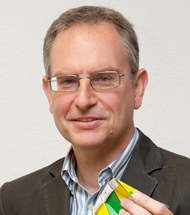Francisco Javier Novo Villaverde, Full Professor of Genetics at the University of Navarra
Chinese twins and the society of the future

Last week, the news about the modification of the genome of two Chinese twins using the CRISPR/Cas9 technique revolutionized the scientific field and made us review the ethical limits of manipulation Genetics. It is worth remembering that this correction technology Genetics was discovered in 2012 and still in the phase of development and optimization; among other problems, we do not know the possible unwanted damage it can introduce. Dr. He Jiankui has used CRISPR to create embryos more resistant to HIV infection. The result was the birth of a pair of twins; in one of them only one copy of the gene was successfully altered, she is still susceptible to the virus but has been exposed to a very high risk of genetic alterations.
The academic community wonders how this could have happened. A few days after the advertisement of this experiment, the committee organizer of the Second International Summit on Human Genome Editing held in Hong Kong issued a statement saying that "even if the modifications are verified, the procedure was irresponsible and did not conform to international standards." However, I am of the opinion that this is a bit of a self-righteous outrage; apparently, the only thing that academic community is concerned about is that He did not fill out all the paperwork or follow the procedures that are usually required in this subject of investigations. That's wrong, but I find it troubling that the whole ethical discussion is reduced to such issues when what is at stake is something much more important.
The point that calls for reflection is the appropriateness of modifying embryo genomes, under what circumstances and for what purpose. The mantra that "it should only be used to cure serious diseases" sounds all very well, but when you go into detail it is difficult to name one status where the correction Genetics of embryos offers a clear benefit over safer, more reliable and affordable alternatives. The reason is obvious. In the case of genetic diseases that are dominantly transmitted, only half of the embryos will carry the disease-causing mutation; the current standard internship is genetic diagnosis and implantation of unmutated embryos. In comparison, the only research performed to evaluate the use of CRISPR in embryos with a disease Genetics, published in August 2017, achieved 75% of embryos with correct genomes. Going from 50% to 75% healthy embryos does not justify the risks of the intervention.
Therefore, if the correction Genetics of embryos is ever implanted, I doubt very much that it will be to "cure serious diseases". The most plausible future scenario, as Dr. He's experiment demonstrates, is that it will be carried out for the purpose of adding some characteristic, absent in the parents, that is considered beneficial; that is, to create genetically improved humans: with more muscle, more intelligence or longer life. Hence, the real discussion should not focus on how many forms to fill out, but on the question that few dare to talk about: whether we should draw any red lines to the modification of human embryo genomes.
This is an urgent discussion . Other countries have already made proposals; in 2015, the U.S. Institutes of Health issued a statement stating that, in addition to the absence of clear medical indications, modification Genetics of embryos should not be done because of uncertainty about their safety and the questionable ethics of introducing changes that will affect future generations without their consent. This year, a British think-tank for bioethical issues proposed that Genetics editing should never endanger the welfare of the individual or introduce disadvantage, discrimination or division in society. In my opinion, the modification of embryonic genomes for breeding purposes Genetics does not meet any of these conditions and should be rejected, mainly for two reasons.
First of all, out of responsibility to nature. Our genomes are optimized by many years of evolution in specific ecological conditions, and we do not know how they will respond to the rapid introduction of new genetic variants. A concern that, by the way, extends to the genetic modifications being made with CRISPR in plants and animals, some as irresponsible as creating dwarf pigs to serve as pets.
Secondly, because eugenic drift will be inevitable. The possibility of creating children designed according to utilitarian criteria will give rise to an elite Genetics in the wealthiest strata of developed countries. For the first time, the human species will have a truly superior "race", at least in terms of its genetic design ; we will have created the most unequal society humanity has ever known.
The next summit on genomic correctness will be held in London in 2021; now is the time to ask ourselves what subject society we want to bequeath to future generations and what measures we need to take to make it possible.
